To improve your sleep and boost your happiness, establish a consistent schedule by going to bed and waking up at the same times. Create a relaxing routine before bed and optimize your environment by keeping your room dark, cool, and quiet. Watch your intake of caffeine and heavy meals, limit screen time, and incorporate physical activity during the day. Practice relaxation techniques to reduce stress. Keep exploring for more tips to transform your sleep habits and your life.
Key Takeaways
- Maintain consistent sleep and wake times daily to regulate your body’s internal clock.
- Create a dark, cool, and comfortable sleep environment to enhance rest quality.
- Develop calming bedtime routines like gentle stretches, music, or aromatherapy to signal winding down.
- Limit screen time and blue light exposure before bed to support natural circadian rhythms.
- Incorporate regular physical activity and relaxation techniques to reduce stress and promote better sleep.
Establish a Consistent Sleep Schedule
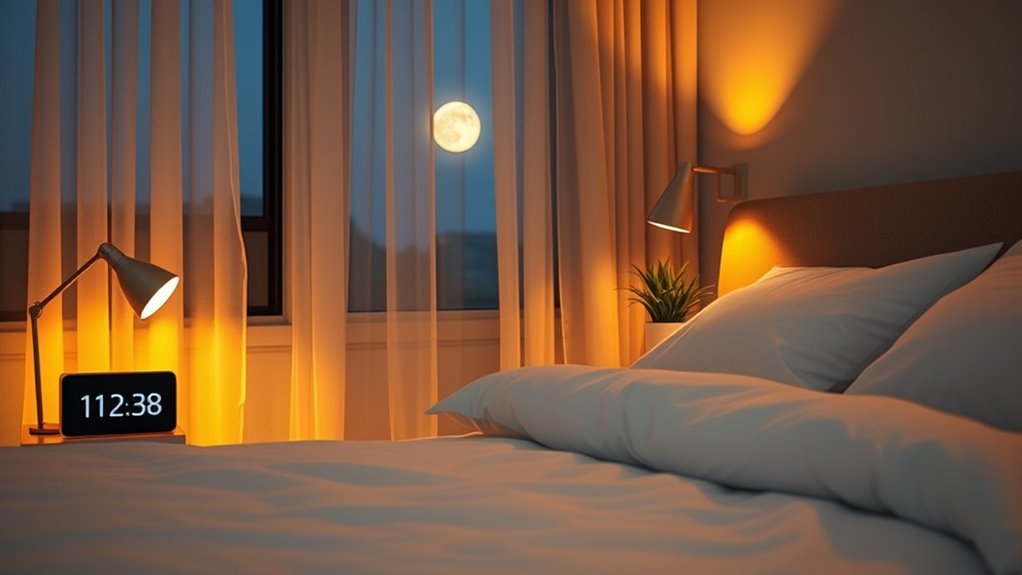
To improve your sleep quality, establishing a consistent sleep schedule is essential. Prioritize sleep consistency by going to bed and waking up at the same times every day, even on weekends. This helps regulate your body’s internal clock, making it easier to fall asleep and wake up refreshed. Avoid irregular sleep patterns that disrupt your circadian rhythm. Incorporate simple bedtime routines that signal your body it’s time to wind down, fostering a steady sleep schedule. Consistency in your sleep habits improves overall sleep quality and reduces sleep disturbances. Stick to your schedule as closely as possible, and you’ll notice your sleep becomes more restorative and less fragmented. High refresh rates also contribute to a more comfortable sleep environment by reducing flickering and eye strain, promoting better rest. A regular sleep routine sets a strong foundation for better rest and overall well-being.
Create a Relaxing Bedtime Routine
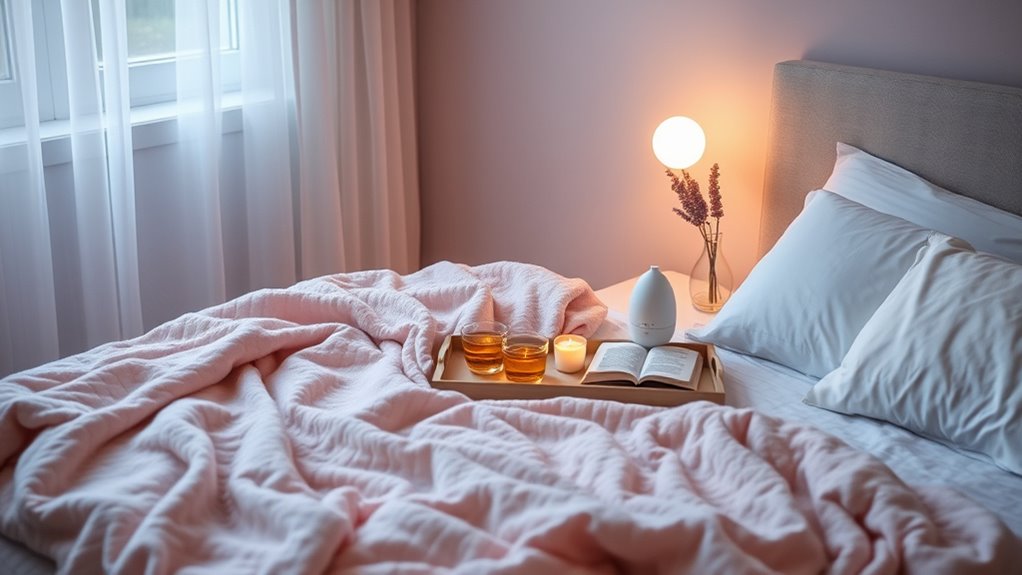
Creating a relaxing bedtime routine signals to your body that it’s time to wind down, making it easier to fall asleep. You can incorporate simple activities that promote calmness and comfort, such as enjoying soothing scents or listening to calming music. These elements help your mind detach from daily stress, nurturing a sense of peace before bed. To craft your ideal routine, consider:
A calming bedtime routine with soothing scents and gentle music helps your mind relax and prepare for restful sleep.
- Lighting a candle with lavender or chamomile scent
- Playing gentle, calming music or nature sounds
- Taking a warm, relaxing bath
- Reading a favorite book in a cozy space
- Practicing deep breathing or gentle stretches
- Incorporating sleep hygiene practices to enhance overall rest and well-being
Optimize Your Sleep Environment
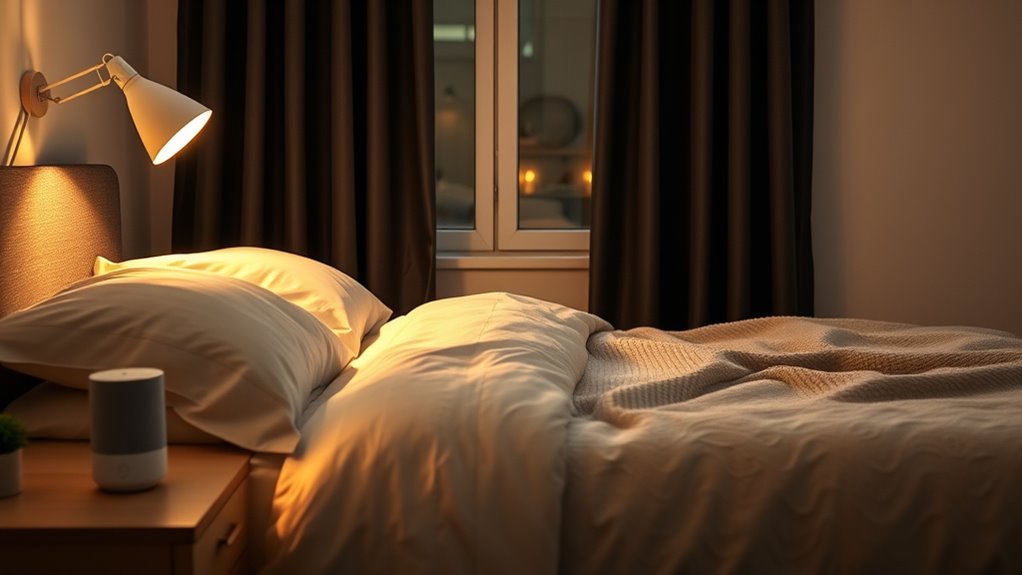
To improve your sleep environment, focus on controlling light levels by dimming or blocking out external light sources. Keep your room at a comfortable temperature, ideally between 60-67°F, to help you fall asleep faster. Small adjustments to light and temperature can make a big difference in the quality of your rest. Incorporating a relaxing environment such as calming water sounds or a gentle breeze can further promote restful sleep.
Control Light Levels
Controlling light levels in your bedroom is essential for promoting restful sleep. Darkness signals your body it’s time to relax and prepares you for deep rest. Use light blocking curtains to keep intrusive streetlights or early dawn at bay. Installing dimmer switches allows you to gradually reduce light, creating a peaceful environment. Feel the difference as soft, controlled lighting calms your mind. Avoid screens before bed, as blue light hampers melatonin production. Instead, embrace a cozy, dark space that invites tranquility. Remember, a dark room isn’t just comfort — it’s a crucial part of your sleep routine. Proper light management can significantly improve your sleep quality.
- Experience the serenity of a pitch-black room.
- Feel your worries melt away in dim lighting.
- Wake refreshed, knowing your environment promotes rest.
- Reclaim peaceful nights with simple adjustments.
- Sleep soundly, knowing you control your light.
Maintain Ideal Temperature
Maintaining an ideal bedroom temperature is key to achieving restful sleep. Aim for a cool, comfortable environment, typically between 60-67°F (15-19°C). Ambient cooling can help regulate the room’s temperature, preventing overheating that disrupts sleep cycles. Use fans or air conditioning to maintain consistent airflow and avoid temperature fluctuations. Additionally, bedding insulation plays an essential role—choose breathable sheets and blankets that wick away moisture and allow heat to escape. Avoid heavy or overly warm bedding, as it can trap body heat. Adjust your thermostat or use a portable fan if needed. Creating the right temperature helps your body relax, promotes deeper sleep, and prevents waking up feeling overheated or cold. Staying mindful of your sleep environment enhances overall sleep quality and well-being. Proper ventilation can further improve airflow and help maintain a steady temperature throughout the night.
Be Mindful of Food and Drink Before Bed

Being mindful of what you eat and drink before bed can considerably improve your sleep. Limit caffeine and avoid heavy meals, which can cause discomfort and keep you awake. Also, cut back on alcohol, as it may help you fall asleep initially but disrupts your rest later. Incorporating digital literacy into your bedtime routine can also help you wind down and prepare for restful sleep.
Limit Caffeine Intake
Since caffeine is a stimulant that can interfere with your ability to fall asleep, it’s important to be mindful of how much you consume before bed. Pay attention to your caffeine timing—cutting off intake at least six hours before sleep can make a big difference. Consider substituting caffeine with healthier alternatives like herbal tea or warm milk, which won’t disrupt your rest. Being aware of your habits can help you reclaim restful nights and wake up refreshed. Remember, small changes can lead to big improvements. Gradually build up tan to avoid skin damage and promote healthier sleep habits.
Avoid Heavy Meals
Have you ever noticed how heavy meals before bed can disrupt your sleep? Consuming large or rich foods can cause digestion discomfort, making it hard to fall asleep or stay asleep. To sleep better, avoid eating heavy meals at least 2-3 hours before bedtime. Opt for lighter, easily digestible snacks if you’re hungry. Here’s a quick guide:
| Foods to Avoid | Better Alternatives |
|---|---|
| Fried or greasy foods | Fruits or nuts |
| Spicy dishes | Yogurt or whole-grain crackers |
| Large portions | Small, balanced snacks |
Additionally, practicing mindful eating habits can help improve your overall sleep quality by reducing digestive strain.
Reduce Alcohol Consumption
Consuming alcohol close to bedtime can interfere with your sleep quality, even if it initially makes you feel sleepy. Alcohol effects your sleep cycle, often causing fragmented rest and reducing REM sleep. Your drinking habits impact how restful your nights are, and oversights can lead to exhaustion and mood swings. To improve sleep, consider these points:
- *Avoid late-night drinks that disrupt your natural sleep rhythm*
- *Recognize how alcohol effects your body’s ability to rest deeply*
- *Break free from the cycle of relying on alcohol for relaxation*
- *Prioritize hydration to counteract dehydration from drinking*
- *Build healthier routines that promote natural sleep without substances*
- Cookies help websites like Fokos enhance user experience and track visitor interactions, which can inform strategies to improve site content about sleep hygiene.
Being mindful of what you consume before bed helps create a more peaceful, restorative sleep experience.
Limit Screen Time and Light Exposure at Night
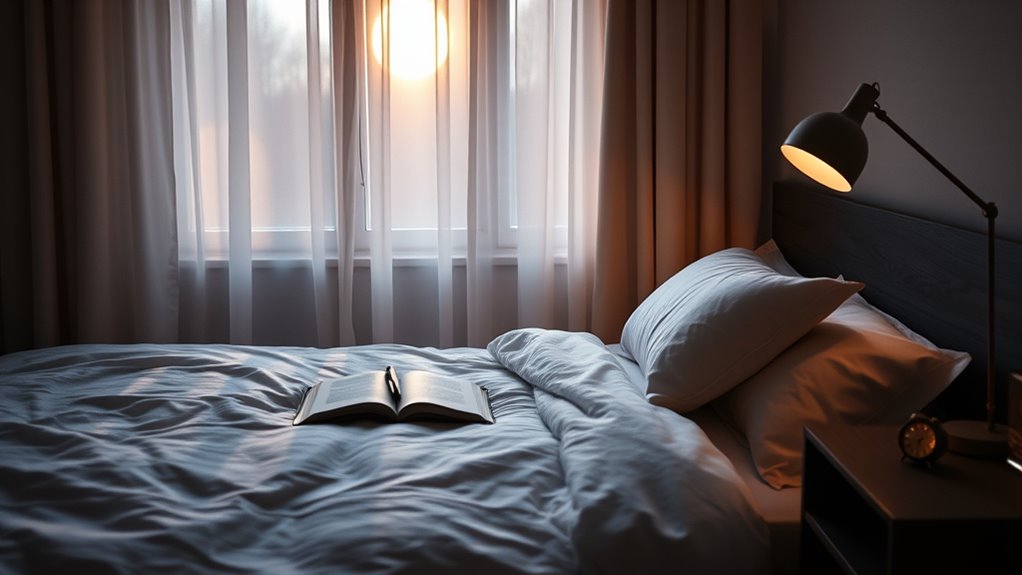
Exposure to screens and bright lights at night can markedly disrupt your sleep patterns because the blue light emitted by devices suppresses melatonin production. To improve your sleep, consider a digital detox an hour before bed, avoiding smartphones, tablets, and computers. Using blue light blocking glasses or screens with built-in filters can also help minimize exposure. Reducing screen time allows your body’s natural circadian rhythm to function properly, making it easier to fall asleep and stay asleep. Creating a dark, calming environment signals to your brain that it’s time to wind down. Limiting nighttime light exposure supports healthy sleep hygiene and gives yourself the best chance for restorative sleep and wake up feeling refreshed and energized.
Incorporate Physical Activity Into Your Day
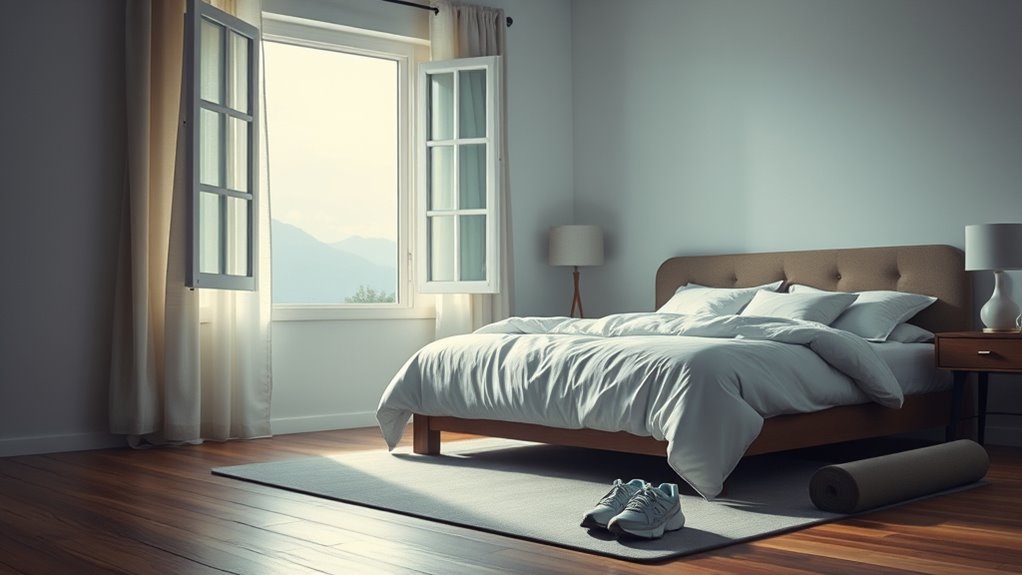
Incorporating physical activity into your daily routine can markedly enhance your sleep quality. Regular movement helps regulate your circadian rhythm and reduces stress, making it easier to fall asleep. You can boost your routine with stretching routines that loosen tight muscles or outdoor activities like walking or cycling that energize you during the day. Engaging in movement also lifts your mood and increases overall energy levels. Imagine feeling more relaxed and refreshed each night. Incorporate activities that excite you, and be consistent. Remember, even small changes can make a big difference. Here are some ways to get moving:
- Enjoy a brisk outdoor walk
- Try relaxing stretching routines
- Take the stairs instead of the elevator
- Cycle through your neighborhood
- Play sports or dance for fun
Manage Stress and Practice Relaxation Techniques
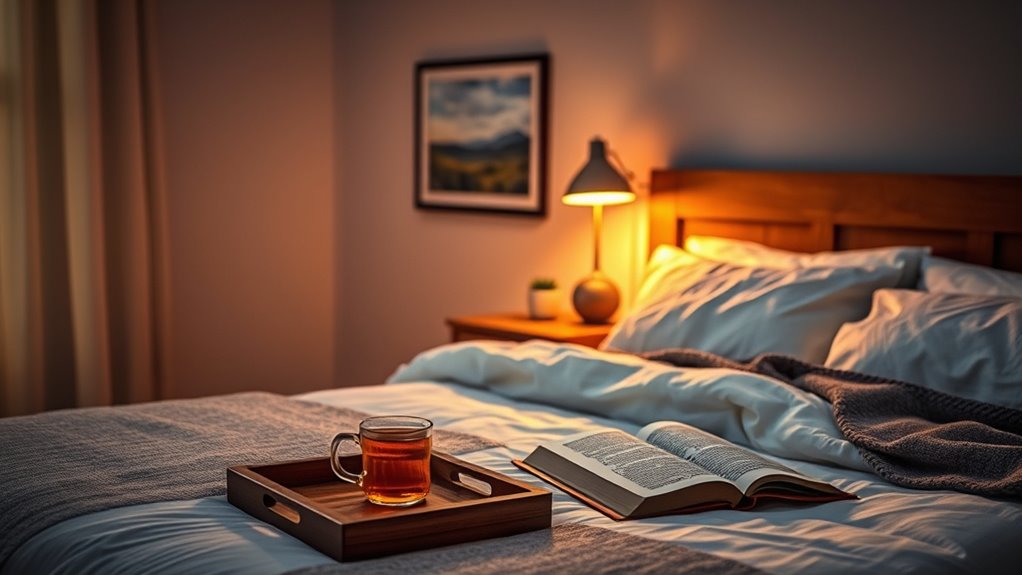
Managing stress effectively and practicing relaxation techniques can considerably improve your sleep quality. Incorporate mindfulness meditation into your routine by focusing on your breath and observing thoughts without judgment. This helps calm your mind before bed, reducing racing thoughts that interfere with sleep. Additionally, try progressive muscle relaxation by tensing and relaxing muscle groups gradually, which releases physical tension and signals your body it’s time to rest. Both techniques promote a sense of calm and help you transition seamlessly into sleep. Make these practices part of your nightly routine to lower stress levels and create a peaceful environment conducive to restful sleep. Consistently applying relaxation strategies like mindfulness meditation and progressive muscle relaxation can significantly enhance your overall sleep hygiene.
Frequently Asked Questions
How Long Does It Typically Take to See Improvements From Good Sleep Hygiene?
You might see improvements in your sleep within a few days to a week when you focus on sleep duration and sleep consistency. Sticking to a regular schedule and ensuring enough hours of rest helps your body adjust faster. However, for lasting change, it can take several weeks. Be patient and persistent, as consistent good sleep habits gradually improve overall sleep quality and daytime energy.
Can Sleep Hygiene Practices Help With Chronic Insomnia or Sleep Disorders?
If you struggle with chronic insomnia or sleep disorders, improving your sleep environment and practicing relaxation techniques can help. For instance, creating a dark, cool, and quiet bedroom may ease your sleep difficulties. While sleep hygiene alone might not fully cure serious disorders, it can reduce symptoms and support treatment. Regularly following these practices helps your mind and body relax, making it easier to fall asleep and stay asleep longer.
Are There Specific Sleep Hygiene Tips for Shift Workers or Irregular Schedules?
If you work shifts or have an irregular schedule, focusing on sleep hygiene is key. You can tackle shift work challenges by sticking to regular sleep times when possible and creating a dark, quiet environment. Use irregular schedule strategies like limiting caffeine before bedtime and using blackout curtains. Prioritize consistency, even on days off, to help your body adapt and improve your sleep quality despite the challenges of shift work.
How Does Sleep Hygiene Impact Mental Health and Emotional Well-Being?
You might think ignoring sleep hygiene won’t hurt, but it actually wrecks your mental health. Poor sleep increases stress, making mood swings worse. Good sleep hygiene helps you reduce stress and stabilize your mood, so you can face daily challenges with a clear mind. Ironically, sacrificing sleep for productivity backfires, leaving you more anxious and less resilient. Prioritize your sleep; your mental well-being depends on it.
What Are Common Mistakes People Make When Trying to Improve Sleep Quality?
When trying to improve sleep quality, you often make mistakes like allowing sleep distractions, such as screens or noise, to interfere. Poor routines, like inconsistent bedtimes or skipping relaxing pre-sleep activities, also hurt your sleep. These habits make it harder to fall asleep and stay asleep. To improve, avoid distractions and establish a consistent routine, creating a calm environment that signals your body it’s time to rest.
Conclusion
By prioritizing your sleep hygiene, you’ll enjoy more restful nights and brighter days. It’s easy to stay busy and ignore your sleep, but sacrificing rest for activity often leaves you exhausted and stressed. Remember, a simple shift toward better habits can transform your life. Sleep isn’t just a pause from activity; it’s the foundation for happiness and health. When you value sleep, you’re choosing vigor over exhaustion, calm over chaos, and a happier life over endless fatigue.









